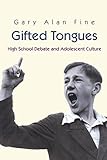Gifted Tongues : High School Debate and Adolescent Culture / Gary Alan Fine.
Material type: TextSeries: Princeton Studies in Cultural Sociology ; 46Publisher: Princeton, NJ : Princeton University Press, [2010]Copyright date: ©2001Edition: Core TextbookDescription: 1 online resource (328 p.)Content type:
TextSeries: Princeton Studies in Cultural Sociology ; 46Publisher: Princeton, NJ : Princeton University Press, [2010]Copyright date: ©2001Edition: Core TextbookDescription: 1 online resource (328 p.)Content type: - 9780691074504
- 9781400824199
- 808.53
- PN4181 .F53 2008
- online - DeGruyter
- Issued also in print.
| Item type | Current library | Call number | URL | Status | Notes | Barcode | |
|---|---|---|---|---|---|---|---|
 eBook
eBook
|
Biblioteca "Angelicum" Pont. Univ. S.Tommaso d'Aquino Nuvola online | online - DeGruyter (Browse shelf(Opens below)) | Online access | Not for loan (Accesso limitato) | Accesso per gli utenti autorizzati / Access for authorized users | (dgr)9781400824199 |
Frontmatter -- Contents -- Preface -- Introduction -- One. Learning to Talk -- Two. Rites of Arguments -- Three. Evidence and the Creation of Truth -- Four. In the Round -- Five. Our Team -- Six. Debate Culture -- Seven. Teachers and Coaches -- Eight. Gifted Leisure and the Politics of Debate -- Nine. Debate and the Adolescent Toolkit -- Appendix. Communities of Debate -- Notes -- Glossary of Debate Terms -- Index
restricted access online access with authorization star
http://purl.org/coar/access_right/c_16ec
Learning to argue and persuade in a highly competitive environment is only one aspect of life on a high-school debate team. Teenage debaters also participate in a distinct cultural world--complete with its own jargon and status system--in which they must negotiate complicated relationships with teammates, competitors, coaches, and parents as well as classmates outside the debating circuit. In Gifted Tongues, Gary Alan Fine offers a rich description of this world as a testing ground for both intellectual and emotional development, while seeking to understand adolescents as social actors. Considering the benefits and drawbacks of the debating experience, he also recommends ways of reshaping programs so that more high schools can use them to boost academic performance and foster specific skills in citizenship. Fine analyzes the training of debaters in rapid-fire speech, rules of logical argumentation, and the strategic use of evidence, and how this training instills the core values of such American institutions as law and politics. Debates, however, sometimes veer quickly from fine displays of logic to acts of immaturity--a reflection of the tensions experienced by young people learning to think as adults. Fine contributes to our understanding of teenage years by encouraging us not to view them as a distinct stage of development but rather a time in which young people draw from a toolkit of both childlike and adult behaviors. A well-designed debate program, he concludes, nurtures the intellect while providing a setting in which teens learn to make better behavioral choices, ones that will shape relationships in their personal, professional, and civic lives.
Issued also in print.
Mode of access: Internet via World Wide Web.
In English.
Description based on online resource; title from PDF title page (publisher's Web site, viewed 30. Aug 2021)


